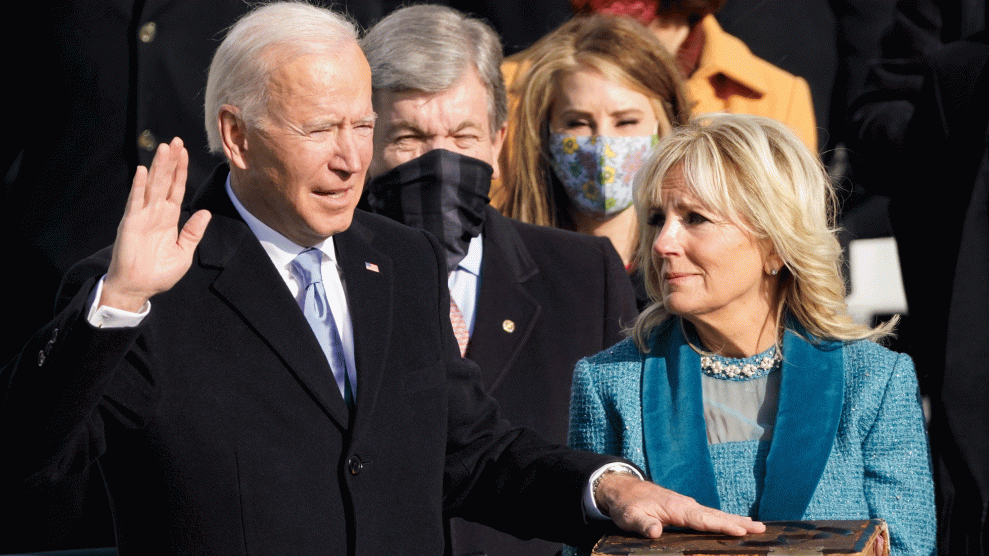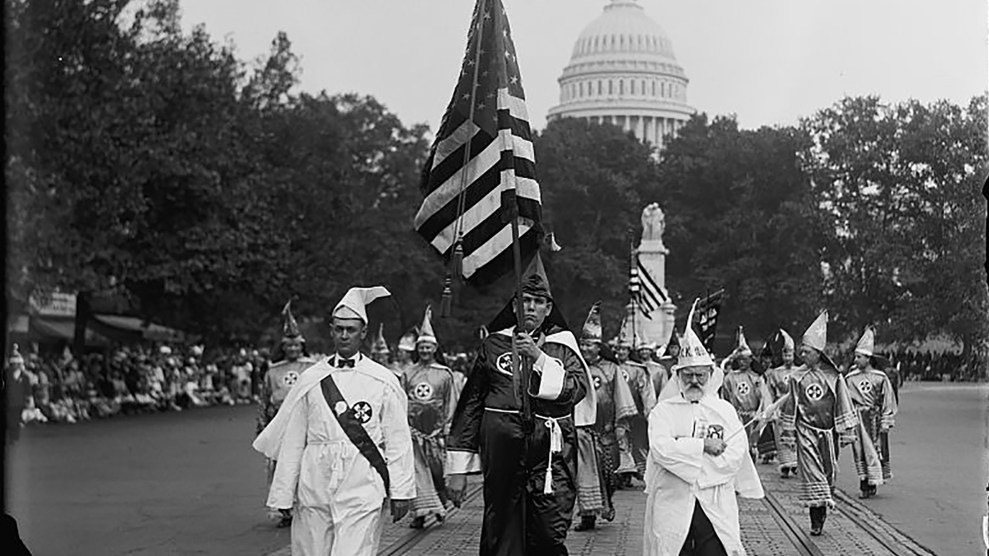
Andrew Harnik/AP
Joe Biden didn’t know how right he was.
Throughout the 2020 campaign, he insisted he was engaging in a “battle for the soul of the nation.” It sounded like a highfalutin bumper-sticker metaphor, readymade to slap on the side of a campaign bus. (Which it was.) But on Wednesday, the former vice president and senator stood at the site of what recently was an actual battleground, the US Capitol, where hand-to-hand combat had transpired, where blood had been spilled, where lives had been lost—just two weeks earlier—in a clash between insurrectionists bent on overturning a legitimate election and those defending American democracy. At this location—now guarded by thousands of gun-bearing troops deployed to protect the nation’s capital from domestic terrorists riled up by the departing president—Biden swore an oath to defend the US Constitution, becoming the 46th president of the United States. In a ceremony that carried a tone of mournful hope, he repeatedly called for “unity,” noting that without it, “there is no peace, only bitterness and fury; no progress, only exhausting outrage; no nation, only a state of chaos.” How to attain that unity? Before a small crowd of lawmakers, other official dignitaries, incoming Cabinet members, and invited guests, Biden only identified the mission, not the means.
It was a beginning rising from a Trumpy ending: an American president starting his job within a highly militarized Green Zone that had been established to thwart threats from pro-Trump extremists. Without these dramatic circumstances, this would have been one of the more poignant inaugurations in the nation’s history, with Kamala Harris, a Black woman, becoming vice president and with a raging pandemic claiming thousands of American lives each day. But it was even more so, as Biden ascended to the chief executive position in the first transfer of power directly marred by violence. This inauguration marked the prevailing of democracy, but its occurrence at a building that a fortnight ago had been ransacked by a murderous and seditious mob served as a reminder of the profound challenges ahead, for despite Biden and Harris’ victory—which depended on narrow wins in several swing states—America’s collective soul remains highly unsettled.
Four years earlier, Donald Trump, an improbable president, had stood here and cast a dark spell, decrying “American carnage.” He pledged an “oath of allegiance to all Americans.” Yet in the White House, he ruled through division, deceit, and demagoguery. His inept response to the COVID-19 pandemic resulted in the preventable deaths of tens of thousands, possibly hundreds of thousands. On his last full day as president, the coronavirus death toll topped 400,000—close to the number of American troops who perished during World War II. And Trump’s dangerous assault on the 2020 election, fueled by his rampant narcissism and authoritarian impulses and predicated on conspiracy theories and lies, threatened the democratic fabric of the nation and led to death and destruction on Capitol Hill—and an under-siege inauguration.
The Trump presidency began with a phony cry of carnage and ended with actual carnage for which he bore (but refused to accept) responsibility. Though Trump’s misdeeds are not the sole cause of the nation’s injured soul, his promotion and exploitation of bigotry, fear, and hatred deepened the wound. Biden acknowledged that the nation is burdened by an “uncivil war that pits red against blue, rural versus urban, conservative versus liberal.” He declared that “in this winter of peril and significant possibility,” there is “much to heal, much to restore,” including the American “soul.”
How does Biden the Healer proceed now? During the campaign, he sincerely reiterated his belief that reason could prevail—that he could talk sense to Republicans, cut deals, and unite the nation. And his inauguration speech’s pitch for unity echoed Thomas Jefferson. In his 1801 inauguration address—following the vicious campaign with incumbent President John Adams—Jefferson stated that after “the contest of opinion through which we have passed…all will, of course, arrange themselves under the will of the law and unite in common efforts for the common good.” But there was no rush to unity then. And the Biden presidency, too, will not have it so easy.
Trump was elected in an America already split, a broken nation in which close to half of the voters were won over by the animus-driven campaign of a racist liar who had boasted of committing sexual assault. Post-Trump, the United States is as, if not more, divided. Trump has done all he could to make sure of that. After he mounted a months-long crusade to delegitimize Biden’s victory in an autocratic bid to retain power, half of Republicans doubt the outcome of the election and oppose Biden’s inauguration. Two-thirds of them believe Trump acted responsibly after the election—even though his ham-handed coup efforts led to murder. Having absorbed Trump’s disinformation, tens of millions of Americans do not accept Biden as the fair-and-square winner. That increases political alienation on the right—and will render it more difficult for any Republican who might want to cooperate (or not reflexively oppose) the new administration.
Addressing the nation as president, Biden recognized that the fight for unity is largely a fight for truth. “What are the common objects we as Americans love, that define us as Americans?” he asked. “I think we know: opportunity, security, liberty, dignity, respect, honor, and yes, the truth.” He continued: “Recent weeks and months have taught us a painful lesson. There is truth and there are lies. Lies told for power and for profit. And each of us has a duty and a responsibility as citizens, as Americans, and especially as leaders. Leaders who are pledged to honor our Constitution to protect our nation. To defend the truth and defeat the lies.” There was nothing subtle here: Biden was indicting Trump and his Republican partners-in-disinformation for pushing the big lie that the election was fraudulent. And he was pointing out that if Americans cannot agree upon reality, unity cannot be reached.
Yet how to usher in an era of truth in politics? And with Biden’s election, has anything changed within the political culture? “I know speaking of unity can sound to some like a foolish fantasy these days,” Biden said. “I know the forces that divide us are deep and they are real.” Still, he told the country, decency, tolerance, and faith in a common purpose can overcome: “We must meet this moment.”
Necessity does not always dictate results. On this front, Biden faces a daunting task. Trump is bequeathing to Biden a highly fractured society, in which a number of Americans are enthralled with crazy conspiratorial notions and committed to warring—for some, literally—with the incoming president and other perceived foes of their America. Trump brownshirts and white supremacists vow violence to come; QAnoners promise to continue their battle against reality. Elected Republican officials pander to extremist elements. Millions see the government in the hands of a diabolical enemy force that must be vanquished.
An inauguration speech cannot heal all this. Nor can kind and good intentions. Biden, Harris, and their crew of experienced and passionate policymakers want to confront the gargantuan issues at hand that Biden explicitly identified in his speech: the pandemic, the walloped economy, climate change, systemic racism, and so on. “It’s time for boldness,” Biden asserted. And a majority of the country are on his side. He and Harris won more votes. Their policy ideas tend to be popular. They have a majority—albeit small—in the House and a razor-thin one in the Senate. They have plans, and they possess power. They can move forward on many fronts without GOP cooperation. Rescuing the vaccination effort, constructing a humane immigration policy, enforcing environmental and financial regulations—none of that requires Republican buy-in in Congress. And in the hours after the inauguration, the Biden White House moved swiftly to implement new policies.
But how to govern and heal in political wartime? Trump had no interest in governing. It didn’t matter to him. Infrastructure Week? It never came. His “beautiful” health care plan? It didn’t exist. The pandemic? It will take care of itself. When he had control of Congress, Trump was able to accomplish the few things he personally craved: tax cuts for the wealthy and conservative judges. He didn’t give a damn about the decaying political culture or about creating consensuses. The soul of America—he couldn’t be bothered.
Biden is aiming big. Fixing a national soul and getting stuff done. He knows that the Senate is full of Republicans who have previously made obstructionism their Holy Grail and that House Republicans, who are only a handful of seats away from regaining the majority, remain stuck within the Trump cult of personality. Will Biden’s gracious invitation to Sen. Mitch McConnell and other GOP leaders to attend church with him make any difference? Will Republicans remain so mired in post-Trump Trumpism that all collaboration is off the table? Worse, Biden could face an extremist and violent opposition that poses a terrorist threat to the nation.
Achieving results—an improved economy, containment of the pandemic—could win over some on the other side. But what ails America’s soul runs deep. It’s rooted in cultural resentment, racism, ignorance, fear, and more. Exploiting all this was easy work for one man. Redressing this will likely require more than the exertions and exhortations of a single person.
Twelve years ago, Barack Obama stood on the western steps of the Capitol—with Biden by his side—and conveyed an expansive promise of hope. It was an optimistic moment. Not long afterward the revanchist rage-politics of Trump triumphed. Biden cannot now simply switch the channel back to sunniness.
In some ways, hatred can be more durable than hope. The fear and loathing of the Trump years will not fade quickly. The 78-year-old wannabe soul-healer who has just relocated to the White House now needs to move quickly to save American lives and prop up the economy—while the underlying conditions that Trump spent years aggravating remain. How does a president confront—or navigate—a sea of animosity and paranoia? Healing and uniting the United States is a monumental task. Much more arduous than hammering out the size of stimulus checks. Might Biden have to decide between governing and unifying? Some diseases cannot be cured. And some tumors cannot be tamed.
There is a fundamental rule of holes: when you’re in one, stop digging. You can’t climb out until that happens. Biden wrested the shovel away from Trump. Americans who desire decency, caring, competence, and commitment in government are entitled to celebrate that. But what to do with this hole? As Biden stood on the steps of the Capitol, he called for national calm. “Politics,” he said, “doesn’t have to be a raging fire destroying everything.” And he intoned, “We must be better than this.”
But can an appeal for unity quash the raging fires? What if his opponents are arsonists who want to keep the fire going? During the speech, Biden observed, “Here’s the thing about life: there’s no accounting for what fate will deal you.” Fate has delivered this can-do optimist the presidency at a time of national conflagration. As Biden gazed out at the capital-city-turned-war-zone, the thousands of troops and the emptiness before him were stark signs that he has assumed an overwhelming challenge—for himself and for post-Trump America.








